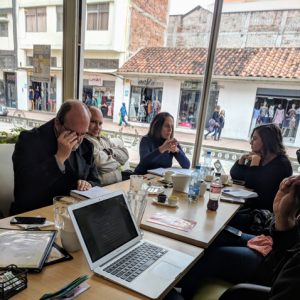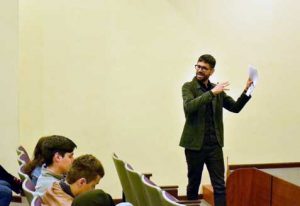Academics and students at a university in Ecuador have been inspired to employ new interdisciplinary research methods and seek greater international collaboration following a visit by Kent Law School Senior Lecturer Dr Luis Eslava.
Dr Eslava was visiting the Universidad del Azuay, in Cuenca, where he delivered a presentation to students at the Faculty of Juridical Sciences on Kent’s distinctive critical approach to studying and teaching law. He also delivered a lecture to academics from across the university, had informal conversations with researchers and met with key Faculty and Law School staff.
During his visit, Dr Eslava ran a three-day workshop on ethnographic research methods and interdisciplinary perspectives for academics. The workshop on ‘Global (Dis)order and Critical Thought: Ethnography, History and Law’ included a short fieldwork exercise held in the city centre and was attended by staff from the schools of economics, medicine, engineering, psychology, architecture and law.
Gabriela Fajardo Monroy, who participated in the workshop, said: ‘Taking part in the activities with Dr Eslava was very valuable from a personal perspective, because, for the first time, I carried out an exercise of qualitative research and, as a result, I appreciated many aspects that are not taken into account in quantitative research. Also, regarding the topic I addressed during the ethnographic exercise, on technology and gender, when we looked at the relevant literature before writing about our experience, I realised how many studies there were, which has enriched my own research.’
Faculty of Law Vice Dean Dr Sebastián López Hidalgo said that whilst critical approaches to law are beginning to be employed across the curriculum and in research projects at the Universidad del Azuay, interdisciplinary methodologies are still new: ‘Our institution is pursuing the professionalisation of faculty, and is particularly interested in creating international networks to put researchers in contact with experienced academics all over the world. In this context, Dr Eslava’s visit was a great opportunity to support junior faculty members in positioning their perspectives and methodologies.’
Dr Silvana Tapia Tapia, Director of Research at the Faculty of Law, an expert in criminal law, legal theory, sociology of law and feminist approaches to law who completed her PhD at Kent Law School last year, hopes there will be further collaborations in the future: ‘Having Luis with us was a truly gratifying experience. We are a small regional university that is growing fast and undertaking projects to enhance research culture and international collaboration. In this context, not only did we benefit from the capacity-building opportunities created through the workshops and presentations by Luis, but we also were able to share Dr Eslava’s experience in critical and interdisciplinary research, with the university authorities who are leading various initiatives toward institutional advancement. These processes of “triangulation”, as Luis calls them, are crucial for Latin American universities to be incorporated into international research environments, with a view to innovate our own structures and at the same time contribute to a more pluralist international space for dialogue and knowledge-sharing.’
Dr Eslava has research expertise in international law. He is,Co-Director of the Centre for Critical International Law (CeCIL) at Kent, a Senior Fellow at Melbourne Law School in Australia and an International Professor at Universidad Externado do Colombia. He also serves as a core faculty member of the Institute for Global Law and Policy at Harvard Law School.




